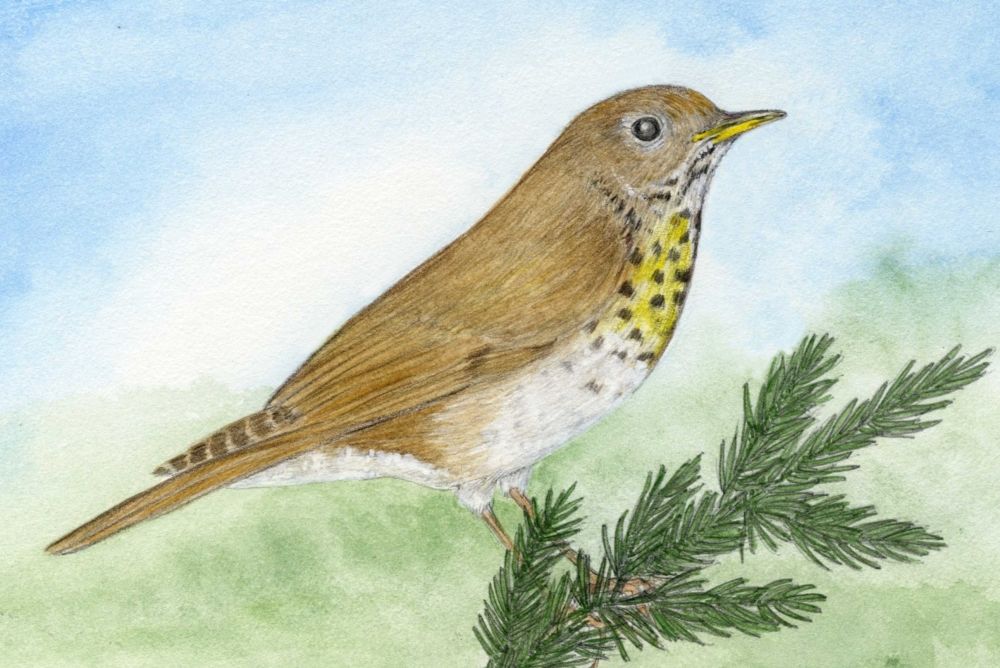
Bicknells Thrush
Latin name: Catharus bicknelli,Conservsation status: vulnerable (population is decreasing)
One of the rarest birds in North America, the female may have up to four mates at one time.
The breeding habitat of Bicknell's Thrush is primarily restricted to mountain spruce forests of Northeastern US and Canada. They winter in the Caribbean and spring migration north is cued by day length. If spring arrives early in the north and the Thrushes arrive at their normal time, the abundance of food—insects and fruit—would already have peaked. Warming temperatures also produce an abundance of spruce and fir cones—feeding and increasing the population of Red Squirrels, a main predator of eggs and chicks. Storms and hurricanes threaten the Thrush's tropical winter habitat. Pollution, logging and deforestation threaten their spring breeding and winter habitats.
Other animals effected by climate change
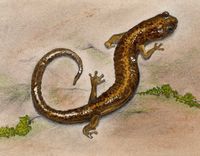 Shenandoah Salamander
Shenandoah SalamanderThe Shenandoah Salamander lives in an isolated, high altitude region of Shenandoah National Park, USA. Like all amphibians who have thin, permeable skin, salamanders are very sensitive to environmental changes. If average temperatures or moisture increase, this salamander, restricted to its cool micro-climate, will be at risk—having no place to go but to lower, even warmer, altitudes. If warming causes other species of lower altitude salamanders to migrate higher, they will compete for the Shenandoah's cool, moist habitats.
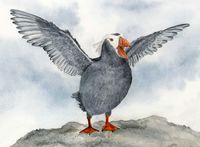 Tufted Puffin
Tufted PuffinTufted Puffins are threatened by sea level rise and storm surges which destroy habitats and breeding areas. In some areas of North America warming seas are causing the fish that the Puffins feed on to migrate farther north, making it difficult for them to find adequate food. Other threats are entrapment in fishing nets, oil spills, pollution, ingestion of plastic, human disturbance of breeding colonies and introduced predators such as rats and foxes.
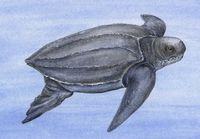 Leatherback Sea Turtle
Leatherback Sea TurtleClimate change impacts the Leatherback in two main ways: an increase in the temperature of nesting sands causes a greater proportion of females to hatch, destabilizing future populations; and sea level rise and stronger, more frequent storms erode nesting beaches and wash away eggs and hatchlings. The Leatherback is also threatened from fisheries by-catch, egg collection, coastal development, pollution and ingestion of floating plastics.
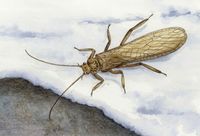 Western Glacier Stonefly
Western Glacier StoneflySince 1960, the average summer temperature in Glacier National Park has increased by around 1 °C and glaciers have declined by 35%. By counting Stoneflies, scientists can determine how quickly glaciers are melting and the temperature of streams. In a two year search begun in 2011, scientists found the Stonefly in only one of the six streams it had previously occupied and discovered that it had retreated to two different streams at higher altitudes. Satellite data confirm that the world’s glaciers are declining, affecting the availability of fresh water for humans, animals and plants, and contributing to sea level rise.
